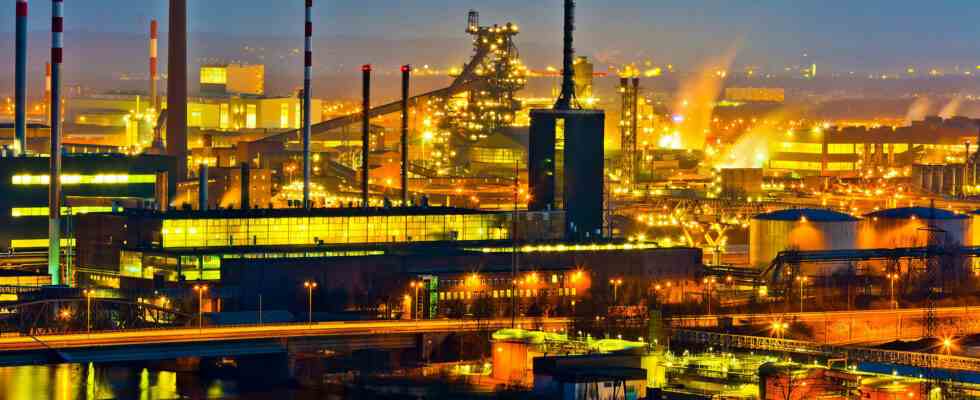Status: 03/30/2022 2:45 p.m
In the event of a gas crisis, the Federal Network Agency is not planning a specific order in which industrial companies will be shut down. Instead, decisions should be made on a case-by-case basis.
After Economics Minister Robert Habeck announced the early warning level of the federal government’s gas emergency plan in the morning, preparations for a possible gas shortage are in full swing. Because in the meantime, the so-called emergency level, in which the state can disconnect some actors from gas, can no longer be completely ruled out.
Economics Minister Habeck calls for early warning after the gas regulation in the conflict with Russia
Julie Kurz, ARD Berlin, daily news at 2:00 p.m., March 30, 2022
Should this third phase actually be initiated, the Federal Network Agency will assume the role of the so-called federal load distributor – and can then decide on the gas itself. “The Federal Network Agency is making all the necessary preparations to be prepared for the emergency level to be declared,” said the authority tagesschau.de with. Damage can hardly be avoided in the situation, but above all must be limited.
However, the regulators in Bonn are not planning a specific sequence of possible shutdowns, as they opposite tagesschau.de said. “The decisions to be made in the event of a shortage are always individual decisions, because the circumstances that then apply depend on so many parameters (including gas storage capacity, weather conditions, European needs, savings achieved, etc.) that they cannot be foreseen.”
Desire for order from the economy
The Federal Association of Electricity and Water Management (BDEW) had called for concrete preparations for the emergency level today. “Although there is currently no shortage, it is necessary for everyone involved to have a clear timetable for their rights and obligations in the event of a supply interruption with Russian natural gas,” said BDEW boss Kerstin Andreae to the Reuters news agency. Because in the event of a delivery interruption, things have to be done quickly.
The companies themselves are also apparently insisting on establishing an order: According to a survey by the SPD Economic Forum, two-thirds of the 175 companies surveyed believe that this is a sensible measure. According to the Federal Network Agency, the repeated request is understandable because of the planning security for the companies potentially affected. “Nevertheless, an abstract regulation does not do justice to the complexity of the decision-making process, nor is it suitable for bringing about viable solutions in advance.”
“Rather, decisions must be made with a view to the concerns and importance of the stakeholders involved, but also with a view to the technical network situation and the existing gas flows in an overall assessment,” the authority justified the procedure. However, criteria are being developed that can be used to a large extent for this overall assessment.
Shutdown of companies based on certain criteria
In any case, one thing is clear: If the federal government should really declare a supply crisis if the situation worsens, protected customers such as households and social facilities such as hospitals or gas-fired power plants that are required for electricity generation would initially have little to fear. They are subject to special legal protection and receive priority care.
Rather, the shutdown is likely to affect industrial companies, which are considered non-protected customers and must therefore be the first to be taken off the grid according to European regulations. According to observers, the criteria for the decisions are, for example, the options for switching to an alternative fuel and reducing consumption, as well as the systemic relevance of the respective industry. The necessary lead time and questions about gas network technology also play a role. However, the process is not yet complete.
For this reason, according to the Federal Network Agency, part of the preparations is an intensive exchange with industry and the energy sector. “The main goal is a common understanding of the operative interaction of the different actors in the preparation and implementation of load-reducing measures,” according to the regulators. The network operators must notify the load distributor of the need for measures at an early stage so that a well-balanced decision can be made in good time. The talks continue tagesschau.de-Information since at least last week.
Message to households and companies
The Federal Network Agency exchanges information with the network operators about the need for load-reducing measures and the specific effects. In addition, the Federal Network Agency is currently updating the results of the 2018 gas shortage exercise and is expanding its surveys.
This is intended to make it easier to assess the consequences of a short-term cessation of gas supply for the companies concerned and in the respective gas networks. An IT-based gas safety platform should provide the information for a decision in a specific individual case at any time.
According to the Federal Network Agency, saving gas and filling the storage reserves are already particularly important. “Voluntary reductions in gas consumption are an important contribution to preventing or at least mitigating the threat of drastic measures.” President Klaus Müller also made it clear on Twitter: “The BNetzA asks consumers and industry to contribute.” In other words: Every kilowatt hour of gas that is not used today could help in the coming winter.

